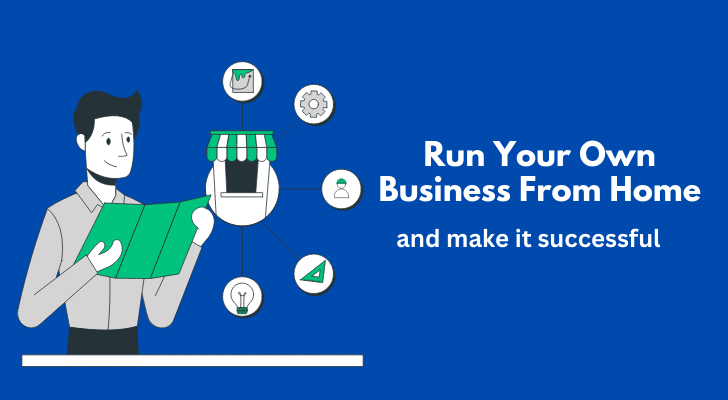Working from home has a certain allure, but it can be hard to know where to start. You don’t want to go the traditional route of applying for jobs or becoming an entrepreneur, but you also don’t want to get stuck in a 9-5 job that offers limited potential for growth and advancement. So what are your options?
There are always exciting possibilities available when you decide to run your own business from home. So start looking at common types of businesses you can consider, how not to waste too much time in planning, and learn the startup basics, so you can make your home business a successful one. It doesn’t matter if you have years of experience or are just getting started - running your own business from home is possible for everyone!
Did You Know?
- As of 2023, approximately 50% of small businesses in the United States are operated from home.
- Home-based businesses contribute an estimated $427 billion to the U.S. economy annually.
- 69% of new businesses in the U.S. start as home businesses.
- 60% of home-based business owners are male, while 40% are female.
- Roughly 58% of small business owners say they started their business to be their own boss.
- Home-based businesses have a survival rate of 70% for at least three years, higher than the average startup.
The World Needs More Love
If you already know what kind of business you want to run, that’s great. But if not - even if you have no clue right now, you can brainstorm yourself and decide what you want to do. What you love to do. What kind of "love" you want to spread inside you, around you, and in the whole world. Ask yourself questions such as;
- Do I want to show my love and make money?
- Do I want to sell the skills that I already have and love?
Once you know it, you can start researching the best way to start your own business from home.
- If you want people to love your products, there are a few options for setting up your home business. You can sell through online marketplaces like Etsy or Amazon, through your own blog site, or through brick-and-mortar stores.
- If you want to spread love by selling skills, some options include offering consulting services, teaching classes, or providing freelance services like writing, design, or programming.
- If you don’t have anything to sell, don’t worry. What matters the most is to spread peace and love. You can start affiliate marketing. You promote other people’s products either through a website or on YouTube.
No matter what type of business you decide to run from home, you can make it successful so long as you are aware that;
- You love what you’re going to do, and you’ll always be excited about it.
- Be prepared to work hard and long hours - running your own business is not a 9-to-5 job.
- Have realistic expectations - it takes time and effort to build a successful business.
- Don't give up - if your first attempt doesn't work out, try again with new ideas and strategies. With patience and persistence, you can turn your dream of running your own business into a reality.
Did You Know?
- About 44% of home-based business owners report starting their business with less than $5,000.
- Technology and the internet enable 69% of home-based businesses to serve customers outside their local area.
- COVID-19 led to a 300% increase in people searching for information on how to start a home business.
- 85% of home-based business owners are satisfied with their business.
- On average, home-based business owners work 30 hours per week.
- Marketing (34%) and time management (33%) are the biggest challenges for home-based entrepreneurs.
- E-commerce sales by home-based businesses grew by 24% in 2020.
Don't Believe In Cheap "Create a Business Plan" Advice
Not too keen on making a business plan? Good. Lots of folks reckon that formal business plans are a bit old-school for today's markets. Here are the reasons.
You're Expected To Be Flexibile
- Adapting on the Fly: Without a rigid plan, you can quickly pivot your strategy based on what's working and what's not. This is hugely beneficial in industries that change at the drop of a hat. You see, being able to adapt is critical for survival.
- Less Pressure, More Creativity: Sometimes, having too structured a plan can stifle creativity. Without one, you might find yourself more open to innovative ideas that can push your business forward in unexpected ways.
Real-World Learning
- Learning by Doing: Jumping straight into action means you learn from real-life experiences. This hands-on approach can teach you more about your market and what your customers really want than any hypothetical scenarios in a business plan.
- Building Relationships Early: Starting without a formal plan lets you focus more on networking and building relationships with customers and suppliers. These connections are invaluable and often lead to insights and opportunities you couldn't have predicted.
Keeping It Lean
- Saving Time and Resources: Let's be honest, drafting a detailed business plan takes a lot of time and effort. By skipping it, you can allocate those resources directly into growing your business. Isn't it more practical to invest in actions that have a direct impact on your success?
- Lean Startup Methodology: This approach focuses on developing your business through iterative cycles of creating, measuring, and learning. It's all about testing your ideas in the market quickly, which a traditional business plan might hold back.

Spread love like there's no tomorrow, baby!
Get the Necessary Training
This is no brainer - get the necessary training. Because you need to gain the knowledge and skills you need to be successful in your business venture.
I’m not walking about a local college or university because that would take too much time and money.
You can also attend seminars or workshops, but they can be awfully expensive too. Expensive seminars/webinars won’t necessarily get you to earn good money. So I wouldn’t recommend the option to a beginner.
There are plenty of online courses that you can start taking whenever you want. Make sure you google and select a program that is reputable and will give you the skills you need to be successful.
Did You Know?
- Social media is the top marketing tool for 78% of home-based businesses.
- Home-based businesses report a 28% increase in productivity when using cloud-based tools.
- 75% of home business owners feel that working from home reduces stress.
- Home businesses save an average of $8,000 per year by not renting office space.
- 82% of home-based business owners believe they have a better work-life balance.
- Remote work technology advancements have increased the feasibility of home businesses by 40%.
- 63% of home business owners reinvest their profits back into their business.
Registering Your Business and Licenses
If you are going for a speciality business that requires qualification, you probably already know that you need to obtain permits, right? But otherwise;
- Figure Out What You Need: Before you dive in, you've got to figure out what kind of license or permits you need. This depends on what you're doing and where you're located. Some businesses might need specific permits, in addition to a general business license.
- Check Local Regulations: Your city or county is your first stop because rules can vary big time depending on where you live. Some places are super chill about home businesses, while others have a list of rules. You'll want to check zoning laws too, to make sure your business type is allowed in your home.
- Home Occupation Permit: In some areas, you might need one of these. It's basically permission to run a business from your home, especially if you're in a residential area.
- Register Your Business Name: If your business name is anything other than your own name, you might need to register it with your city or county. This is often called a "doing business as" (DBA) filing.
- Get Your Business License: Once you know what you need, you'll usually apply for your license through your city or county's business license department. This might be online, in person, or through the mail. You'll likely need to pay a fee, which can vary.
- Special Permits or Licenses: Depending on what you're doing, you might need additional permits. Think health department permits for food businesses, or a professional license if you're offering certain services.
- Understand the Tax Implications: Running a business from home can affect your taxes, offering potential deductions for home office use, but also adding responsibilities like self-employment tax. Might be worth chatting with a tax pro to get this part right.
- Stay on Top of Renewals: Most business licenses and permits aren't one-and-done deals; they need to be renewed periodically. Mark your calendar so you don't forget.
- Review and Adjust as Needed: If your business grows or changes, your license and permit needs might change too. Keep up with this to avoid any legal headaches.
- Consider Privacy: Running a business from home means your home address might become public information. If that's a concern, look into options like a virtual business address.
Whether you’re required to register with a particular body or not, you may need to come up with;
- Your business name (some clever brand name, or just use your name)
- Designing some marketing materials - logo, brochure, website, etc.
Marketing and promoting your new business will be necessary sooner or later anyway. So you may want to start forming some ideas whenever you have time.
How I "Finally" Make Over $7,000 Monthly Income
"The most valuable thing I've ever done!"
Find the Right Location for Your Home Business
Will You Need To Rent a Place?
If your business is mainly online or phone-based, you can just simply work from your living room. But if you’re going to be dealing with customers face-to-face, you might want a space that looks professional and inviting.
Even if you’re working from home, you'll still need a basic setup though, because the work environment will often affect productivity when you look at the long term.
The Area To Choose
If you’re hiring a place, the amount of traffic is also something to keep in mind. If you’re in a high-traffic area like a busy street or shopping center, that can mean more potential customers or clients passing by. But it also means more distractions and noise which can make it harder to concentrate.
A quiet residential neighborhood might be better for some businesses while others would do better in a busier area – it really depends on your specific needs.
Rent/Mortgage Payments
The cost of rent or mortgage payments is also an important factor to consider when choosing a location for your home business. You don’t want to overspend on your space and end up strapped for cash down the road. Look for something that fits within your budget and leaves you room to grow.
Zoning Laws
Look into zoning laws and other regulations in your area. Some cities or towns have restrictions on what kind of businesses can operate from a residential address, so you’ll want to make sure you comply with any local ordinances before committing to a space.
Set Up Your Home Office

Setting up a home office with a vibe of love and warmth is a fantastic way to ensure you'll enjoy spending time there. Here's how you can create a space that feels both professional and cozy:
- Choose the Right Spot: Pick a quiet corner of your home where you can work undisturbed. Natural light can boost your mood, so near a window is great if possible.
- Comfortable Seating: Invest in a comfortable chair. You're going to spend a lot of time sitting, so loving your back means getting a chair that supports it.
- Desk with Personality: Get a desk that fits your space and your style. Whether it's sleek and modern or cozy and vintage, loving your workspace starts with this centerpiece.
- Tech That Works for You: Yes, a reliable computer is a must. Also consider the quality of your webcam and microphone for video calls. Loving the tech you use every day makes work feel less like work.
- Organized and Accessible Files: A filing system you can understand and easily access will reduce stress. Love your future self by keeping things tidy from the get-go.
- Personal Touches: Fill your office with items that make you happy. Photos of loved ones, plants, artwork, or even a small lamp with a warm glow can make the space feel inviting.
- Good Lighting: Make sure your office is well-lit. This can mean a mix of natural light, overhead lighting, and task lighting. A warmly lit room can boost your mood.
- Keep It Green: Plants not only purify the air but also add a touch of life and color. Caring for something can be a lovely break from the screen.
- Comfort Items: A soft rug underfoot, a cozy blanket over your chair, or even a small space heater can make your office feel more like a sanctuary.
- Sound Matters: If you enjoy music while you work, set up a small speaker system. Or, if you prefer silence, consider noise-canceling headphones to block out distractions.
- Scents and Aromatherapy: A diffuser with your favorite essential oils can help keep the atmosphere calm and pleasant.
Also Read: Setting Up Your Home Office in the Basement
Your home office is a reflection of you. It should be a space where you feel productive, yes, but also peaceful and happy. Taking the time to fill it with love in these ways means you're not just creating an office; you're creating a haven.
CyberCash Wonderland

"Babe, I can't take this anymore! They said the best way to launch my essential oil business is with a cheerleadering routine! Did you get the photo I just sent you? Mini skirts? Exposed midriffs? Do I really have to look like this? Who said? My agent said everyone's doing this! Everyone says pom-poms are mandatory. Do you think so too? I'm devastated! I just want to be a simple, essential oil-loving entrepreneur...I'm 72!"
Crafting Love with Quality
In the heart of your home business, let love be your guide, especially in the quality of what you offer. It’s not just about having something good to sell; it’s about pouring care and affection into every interaction with your customers.
- Heartfelt Feedback: Embrace every piece of feedback with an open heart. When a customer takes the time to share their thoughts, listen with love. If their ideas can make your business better, let them see their suggestions come to life. It’s a beautiful way to show you value their voice.
- Surprise and Delight: Find joy in giving more than expected. Maybe it’s a personal note, a small gift, or an extra service you didn’t charge for. These surprises make your customers feel deeply cared for, transforming a simple transaction into an act of love.
- Meticulous Attention: Regularly check your products or services for perfection. Showing you care deeply about delivering only the best is a powerful expression of love for your customers.
Spreading Love through Community

Creating a community around your business is like opening your home to friends, nurturing a space where everyone feels welcome and valued.
- Social Spaces: Use social media not just for promotion but to build a genuine community. Share stories, tips, and moments that matter to you and will resonate with your followers. It’s about creating connections that feel like friendship.
- Gather and Grow Together: If you can, bring your community together in the real world. Workshops, pop-up events, or casual meetups can strengthen the bonds between you and your customers, making each feel like a cherished part of your business family.
- Celebrate Your Customers: Shine a spotlight on the stories of people who support your business. When customers see themselves and their peers celebrated, it reinforces their sense of belonging and shared love.
Communicating with Heart
In every message, every update, and every piece of content, let your authenticity shine. People gravitate towards genuineness, and being real builds a foundation of trust and love.
- Speak from the Heart: In your marketing, be yourself. Share your journey openly—your inspirations, the hurdles you’ve leaped, and the dreams you’re reaching for. This honest narrative invites people into your story, building a connection grounded in mutual respect and affection.
- Openness in Action: Let your customers behind the scenes. Whether it’s sharing how you improve your offerings or the day-to-day joys and challenges of running your business, these glimpses into your world invite a closer connection.
- Tailored Touches: Whenever someone reaches out, respond with care and consideration. Personal replies show that you see them as individuals, not just as another sale. It’s a simple but profound way to spread love, one interaction at a time.
Letting love lead the way in your home business isn’t just about what you do; it’s about how you make people feel. It’s creating an atmosphere where every product, service, and interaction is infused with care and affection. This approach doesn’t just build a customer base; it weaves a community bound by mutual respect, support, and love.
Affiliate Marketing
Whatever business model you decide to go for, you should also try affiliate marketing. Because as an affiliate marketer, you have the unique opportunity to cross-sell products to users.
By promoting complementary products, you can add value to your customers and increase your own earnings.
For example, if you are a self-development coach who promotes spiritual healing and Yoga exercise programs, you can cross-sell related books or equipment such as Yoga mats to your audience.
Or, if you make your own hats and sell them, you could cross-sell other accessories to help your clients get more traffic to their websites.
Cross-selling is a great way to boost your income and provide more value to your customers, and affiliate marketing will help you achieve it. Of course, you don’t have to have your own products to sell - you can be a full-time affiliate marketer, too.
Run Your Own Business From Home: Conclusion
Running your own business from home is an amazing way to gain time and financial freedom while having the flexibility to work on something you are passionate about.
The success of such a project relies heavily on the right mindset and guidance, anyone can have their own successful business in no time. Remember, anyone has what it takes to become their own boss, so you can do this too.



I agree with what you say, if you are dedicated 100% to what you love then you will be successful but the question is how long does it take? You don’t wanna waste years of your precious life stuck at home typing stupid promotional emails.
Thanks for your comment Karson, agree. Life is too short to cling on to something that's not working!